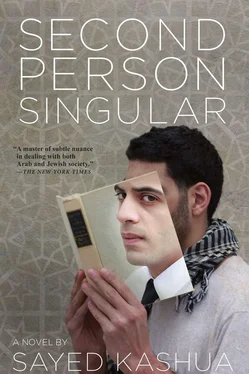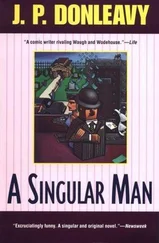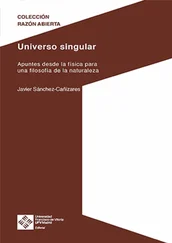“You don’t remember me?”
“I do,” I said. “Number six.”
“Noa,” she said, shaking my hand. The soft touch of her long fingers in my palm made me withdraw my hand quickly.
“You looking for an apartment?”
“No, I live here.”
“Oh, you’re a Jerusalemite?”
“Yes,” I said. “I work over at the café down the block. What about you?”
“I don’t know the area at all. And I don’t really understand what a school like Bezalel is doing in the middle of this city. Just the thought of four years in this place weirds me out.”
“You’re looking for an apartment?”
“Yes, I’ve been to this fucking city every day. Sorry. I must have seen five or six places already, but you have no idea what kind of rat holes they rent around here for five hundred dollars!”
“I know. The prices are crazy.”
“I found something nice today, though. In Nachlaot. I figure if it’s going to be Jerusalem, I might as well go all the way.”
“Yeah, all the Bezalel students live there.”
“This goes to the central bus station, right?” she asked, pointing with her chin toward an approaching bus.
“Yes,” I said.
“Good seeing you. I’ll see you in school, right?”
“I didn’t get in.”
“What?” she yelled, and I heard her say, “No way!” as the bus closed its doors.
I’m glad that just happened, I thought as I waited for the bus to Beit Hakerem. I’m glad it happened now. I needed that wake-up call, that smack in the face from Bezalel. I am a social worker, with a degree from Hebrew University, with good grades and the ability to get a good job. Why have I been wasting my time with photography? Why have I been wasting my time in an attic redolent of medicine and excrement?
LETTER
I fed Yonatan, brushed his teeth, changed his diaper, put him in his pajamas, moisturized his hands and feet, and got him ready for bed. I’d put my escape off until tomorrow. In the morning, I thought to myself, tomorrow morning, as soon as Osnat shows up, I’ll tell her that I’m leaving. I won’t even demand my salary for the days I worked in August. I’ll just disappear.
When Yonatan’s eyes closed, I took down the camera from the top shelf. I hadn’t taken a single shot since that cursed day when I went to the Bezalel interview. During the six months before that, I had shot about half a roll a day, about three rolls a week, but since that day, nothing. The thrill was gone. During the first week after the interview I still kept the camera slung over my shoulder, but after that I put it back in the closet. Now I took off the lens and looked through it, aiming at the farthest point of light outside the window, then I turned it toward Yonatan and tried to focus on his half-closed eyes.
I almost dropped the camera when I heard knocking on the attic door. “Just a second,” I yelled as I stuffed the camera back in its box and up on the shelf. I tried catching my breath as I opened the door. I didn’t know that Ruchaleh was home. Ordinarily I kept very close tabs on what was happening on the floor below me, listening to the jingle of keys as she returned home, following her steps and the sound of the keys hitting the wood of the dining room table. The faucet, the opening of the fridge, the bottles, the clink of the plates, the lights. I could always tell when she was in the living room and when she was in the bedroom. That night, maybe because she had come home earlier, while I was still in the bathroom with Yonatan, I hadn’t heard her come in.
“I think someone meant to send this to you,” she said, handing me an envelope and then leaving, shutting the attic door behind her. It was from Bezalel. I recognized the logo on the front of the envelope, next to the sticker that bore my name, which is to say Yonatan’s, and the address of the house in Beit Hakerem.
“I’m really sorry,” I said to Ruchaleh. She was sitting on the couch in the living room reading a book. I had never before started a conversation with her, but it was clear that she knew I had been using her son’s identity. She had not opened the envelope.
“I didn’t mean to,” I said, begging her forgiveness, avoiding her eyes. “I really don’t know what came over me.”
“Sit down,” she said, but I remained standing, eyes downcast.
“Again,” I said, “I’m really sorry, ma’am. It was just a game. I really don’t know why I decided to write your son’s name down and not my own.” I really didn’t know if the whole thing had happened because Yonatan had been a photographer or because the camera belonged to him or because I had learned everything I knew from his books, his pictures. Maybe it was just a game, I don’t know. But when I was taking photographs I was someone else, someone unfamiliar, foreign. Holding the camera in my hand I felt like an extension of Yonatan or the continuation of what he had been. I didn’t tell her about the post office box or the café or the bank account. She might not understand.
“Ma’am. .” I started.
“Don’t ma’am me,” she said. “Sit down. And don’t give me this I’m-an-obedient-little-Arab routine.” No one had ever called me a little Arab before or spoken to me in that tone.
“You’re insulted?” she asked. “Good, I’m glad. Now do me a favor and do yourself a favor and don’t talk to me in that groveling slave-at-the-master’s-house tone. And sit down already.” I sat before her, prepared to fling one of her books in her face. I’m not apologizing anymore. Let her call the police for all I care. I’m not scared of her or of anything else in this world.
“Listen to me, ma’am,” I said, this time in a gruff tone. “I know I did something wrong, something that I can’t even explain to myself at this point. But I don’t intend to study photography using your son’s name and I had no good reason to apply as him. As you know, I have a Bagrut certificate and a BSW and my chances of getting into Bezalel, if I really wanted to go there, were far better if I’d applied as an Arab.”
“Yes,” she chuckled, “I’m familiar with Bezalel’s system. They take every Arab that applies. Maybe that’s what led you to apply with a Jewish name?”
“No, not that.”
“Then why? I can understand the desire to want to be judged for who you are and what you’ve done and not your nationality or your ethnicity. That’s a very reasonable thing to do.”
“I don’t think that’s why.”
“No? You applied with a Jewish name, an Ashkenazi one, the kind that has no chance at affirmative action. I think you probably didn’t want to feel like someone was doing you a favor.”
“I don’t really know why I did it,” I said again, realizing that she wasn’t interested in chastising me or charging me with an offense. “Maybe it was because I knew that Yonatan wanted to go there,” I said without thinking, and I saw her expression change. Perhaps only now was she realizing that I had been looking through all of his things.
“I know,” she said.
“I’m really, really sorry. I didn’t mean to offend you.”
“You didn’t,” she said, and then added, “Well, don’t leave us hanging.”
“What do you mean?”
“The letter,” she said. “What does it say? Did you get in?”
The lawyer leaned against the wall and tried not to collapse onto the filthy tiles of the bathroom floor. The thump of the speakers pounded his eardrums. Feeling like someone on the deck of a bucking ship, he tried to take a deep breath and scatter the collage of nauseating images. He leaned against the wall, legs weak and untrustworthy, and stuck his hand out for some toilet paper but felt only metal. Looking out of the corner of his eye, which took considerable effort, he saw that there was no toilet paper to be had. There was a thick roll of paper towels on top of the toilet and he spread his legs out, anchoring himself on the wet, filthy floor, and reached for them. He palmed the wall behind the toilet as he reached forward and in that way managed not to fall. Once he felt his body was adequately prepared, he let go of the wall and, with the sleight of hand known only to three-card monte players and expert pickpockets, snatched the roll of paper. He ripped off a big piece, put it on the floor near the toilet and with his foot began mopping away some of the mud and grime. Placing more paper on the floor, he felt a wave of relief as he dropped to his knees in front of the toilet. He wrapped a long length of paper around his hands, fashioning a pair of paper mittens, and held on to the sides of the toilet bowl as he brought his face close to the foul water at the bottom. He thought he could see the shimmering reflection of his face.
Читать дальше












